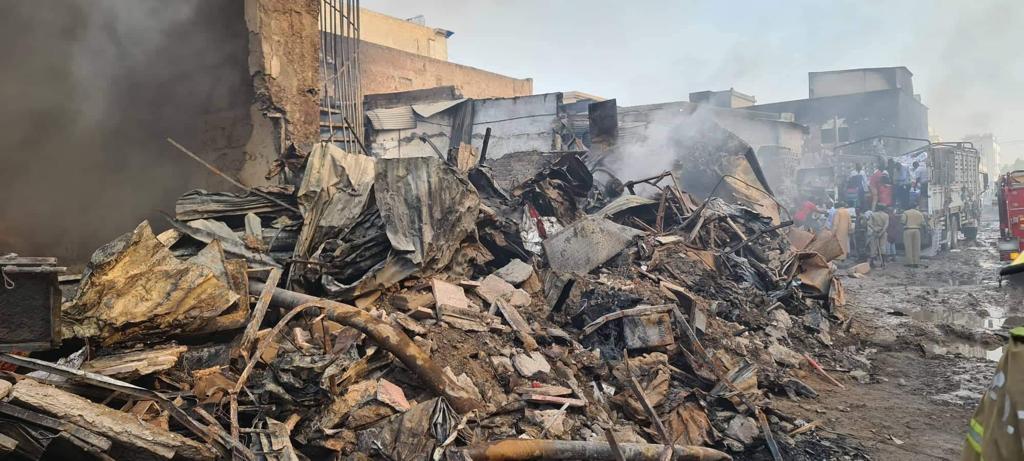On 1 April 2022, a massive fire burnt down Waaheen market, Somaliland’s largest open-air market, located in the centre of Somaliland’s capital city Hargeisa. The fire lasted over 24 hours, sweeping across all businesses in the market and affecting wholesalers as much as small-scale retailers. Thankfully no human lives were lost.
The exact cause of the fire remains unknown, though the most plausible explanation is that it was caused by electrical failure. The congested layout of the market, with stalls composed of wooden structures and plastic sheets, helped the flames to spread. Most traders lost all their assets in the fire. A clothing stall owner told Al Jazeera: “We ran 3 kilometers to the fire… I worked with the firefighters to remove the stock… It was very dangerous.”
Residents, business owners and firefighters fought through the night to contain fire and prevent the flames from spreading to neighboring shops and residential homes. However, the overcrowded market with its narrow lanes was difficult for firefighters to access. In addition, every major road leading to the epicentre of the fire was blocked by the goods of businesses. Somaliland officials had already raised concerns about the fire risk posed by the market. The Commanding Officer of the Somaliland Fire Brigade commented on this risk in an interview on 18 March 2022, after his firefighters had managed to extinguish a smaller fire in Waaheen market:
“The businesses in Waaheen market are blocking the roads that the firefighters would use during emergencies. We tried our best to convince the traders to open the roads… unfortunately, all our advice and requests fall on deaf ears, and the firefighters are ending up deeper into the fires… the situation of the market remains a ticking time bomb which can explode anytime.”
The informal structure of Waaheen market was established in the 1990s, in the years after the return of Somaliland citizens from the refugee camps in Ethiopia and was successively expanded. The market provided employment for over 12,000 people, many of them living at the subsistence level. This has led successive local and national government administrations to accept the sprawl of informal businesses. Over the years, some government officials have tried to address the fire hazard problem, but action was always inadequate.
Following his election in 2021, the Mayor of Hargeisa started negotiations with the market’s business committee to address the fire hazard issue. However, the committee could not agree on joint actions, which derailed efforts to reorganise the market and unblock roads. After the fire was put under control, one of the business owners in the market said: “We cannot blame anyone but ourselves, we are the ones who resisted reorganisation of the market and declined to collaborate with the local government.”
Poor city planning, lack of infrastructure regulations and weak law enforcement form the background of the devastating fire, which not only destroyed buildings (some of historical importance), but also left thousands of Somalilanders without income for themselves and their extended families. According to estimates of the National Support Committee for the Victims of Waaheen Market, a committee appointed by the Somaliland President, the value of the businesses and assets lost by the fire was close to US$2 billion, making it the greatest economic loss ever experienced in the country since it was established in 1991.
The fire destroyed the assets and incomes of people who have no access to banks and financial credit. Furthermore, due to Somaliland’s unrecognized international status, it is unable to access funds from international financial institutions. Many world leaders, however, expressed sympathy for the Somaliland people, and some even promised financial support. For example, the Prime Minister of Ethiopia sent a high-level delegation led by the Finance Minister. The UK Prime Minister pledged support to Somaliland, though this has yet to materialise.
The Government of Somaliland took immediate action and commenced paying compensation to the victims of the Waaheen market disaster. According to the Somaliland Chronicle, the government has so far paid out US$1.8 million to 988 different business owners, US$8 million has been pledged by the Somaliland business community, with the World Bank also promising US$12 million.
In addition, in cooperation with the National Support Committee for the Victims of Waaheen Market, the government started a clean-up operation which was followed by the formation of a national committee to redesign and rebuild the market. The government has also decided to restructure all markets in Somaliland, and to improve fire safety more broadly, in order to better protect lives and livelihoods in the future.
There are two main lessons from the fire that destroyed Hargeisa’s largest market. First, there is an urgent need for better urban planning and government enforcement of all relevant regulations, including in relation to electrical safety. Second, in this instance the disaster demonstrated that people are capable of great solidarity. Many citizens rallied behind their national institutions who showed genuine support for victims of the fire. Citizen-to-citizen support was particularly important in healing divisions caused by last year’s parliamentary and local elections.
Dr Nasir M. Ali (Director at the University of Hargeisa’s Institute for Peace & Conflict Studies) and Ayan Yusuf Ali (Research and Projects Manager at the University of Hargeisa’s Institute for Peace & Conflict Studies) are members of the Inclusive Urban Infrastructure (IUI) team. IUI is a project funded by UK Research and Innovation through the Global Challenges Research Fund under the title ‘Towards Trajectories of Inclusion: Making infrastructure work for the most marginalised’ (grant reference number ES/T008067/1).
